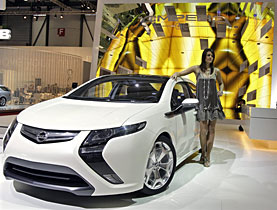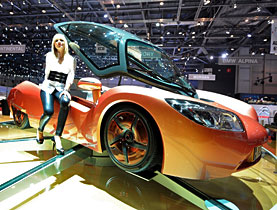Motor industry gears up for green revolution

Carmakers might be in a tight corner, but that hasn't stopped them unveiling some remarkable new green cars and technologies at the Geneva Motor Show.
Executives are hoping that a new greener fleet of vehicles can open wallets and kick start the stalled motor industry, which is experiencing its worst slump in sales for 35 to 50 years.
The drive towards fuel economy, cleaner emissions and new technology is in full display in Geneva. Nearly all stands boast cars with low CO2 emissions, and the show itself is also dedicating an entire pavilion to environmentally friendly vehicles, not just those with lower fuel consumption but also newer technologies, from hybrids to battery-operated cars.
Of the 85 new world and European premieres showcased in Geneva, 15 were electric cars.
This green shift seems to have impressed many journalists.
“This industry never ceases to amaze me in terms of its ingenuity in coming up with cleaner, more fuel-efficient, faster cars. Sorry if I sound like a cheerleader, but they’re producing really extraordinary products at this point despite the crisis they’re in and partly because of it,” John Reed, motoring correspondent at the Financial Times, told swissinfo.
The trend towards greener cars has gathered pace since the European Union struck a makeshift deal last year to cut greenhouse gas emissions from cars, setting a 130g/km target in a phased approach starting in 2012, with full compliance in 2015. The current EU-wide average is 158g, compared with 183g for Switzerland.
“The Swiss have a greater purchasing power so buy bigger cars that are more damaging to the environment,” explained Noëlle Petitdemange, spokeswoman for the Transport and Environment Association.
Carmakers are therefore under pressure to comply or at least to get close to the emission targets, since otherwise they will face fines.
Short-term solutions
In the short term most European firms, the long-standing leaders in diesel technology, are relying mainly on “clean” diesel engines, which are more expensive but at least 20 per cent more efficient than a similarly sized petrol engine.
Many big carmakers have also joined the Japanese in exploring hybrid petrol-electric engines.
Toyota, with its third-generation Prius due out later this year, now has competition from the simpler, cheaper but less fuel-efficient system in the new Honda Insight.
“But Toyota is the only one at the moment which can deliver a full hybrid, where the electric motor and petrol engine can drive the car each by themselves,” boasted Philipp Rhomberg, general director of Toyota Suisse.
Hybrids are seen as short-term solutions until companies manage to solve the problems of prohibitively expensive batteries and launch affordable electric cars – maybe in as little as ten to 15 years’ time.
The future’s electric?
Nevertheless, a number of big companies are already showing off their electric ambitions and rushing to be the first to bring out mass-production models.
In Geneva, General Motor’s troubled Adam Opel GmbH subsidiary presented the lithium-battery powered hatchback Ampera, the European relative to the Chevrolet Volt, which could be available from 2011 if the company survives.
Other firms, including Chrysler, Mitsubishi and Ford, also unveiled their plans for cars with electric motors.
Mitsubishi announced it had reached an agreement with Peugeot Citroen to sell its new electric car “I MiEV” to European customers as early as late next year.
Nissan also said last week that it had agreed with the Portuguese government to consider setting up a lithium-ion battery plant in Portugal as it aims to put electric vehicles on the mass market in Europe and globally by 2012.
Nissan’s partner, Renault, is looking to launch four electric cars between early 2011 and early 2012. Renault is also working on plans to introduce a European-wide electric car infrastructure by 2012.
Cheaper, simpler technology
Until the cost of clean diesels, full hybrids and electric cars drops, firms are relying on cheaper, simpler technology.
Fiat last week unveiled the new two-cylinder Multiair engine in Geneva that it claims is revolutionary in design, making it possible to reduce fuel consumption and carbon emissions by up to 10 per cent.
Mazda says it aims to cut its European fleet’s CO2 emissions by 30 per cent by 2015 by reducing vehicle weight and mounting an engine idling feature for when the car comes to rest. Daimler, Hyundai and Kia are also planning similar technology.
Ultimately, beyond the technology, one of the biggest challenges facing the motor industry is actually persuading the consumer to buy green.
“We have new technologies with hybrid and electrical systems that give the same kind of power, reduce fuel consumption, are more ecological and save money; it’s a win-win-win situation,” Swiss adventurer and ecologist Bertrand Piccard told swissinfo at the motor show.
“But it’s also true that some people are afraid of new things. It’s a psychological problem that we have to solve, not a technological one.”
swissinfo, Simon Bradley in Geneva
On March 5, Swiss President Hans-Rudolf Merz opened the Geneva International Motor Show, which runs until March 15, and is expected to attract some 700,000 visitors.
Some 85 world and European premieres are announced, with 15 dedicated to electrical cars alone.
Around 40 per cent of the visitors travel from outside Switzerland, with many from neighbouring Germany, France and Italy.
The organisers claim that the Geneva motor show generates SFr300 million ($254.3 million) in direct and indirect income.
Car sales Jan-Feb 2009 (compared with same month 2008)
US: -41% (February)
Europe: -27% (January)
Japan: -32% (February)
Switzerland: -18% (January)
Overall car sales 2008 (compared with 2007)
US: -18%
Europe: -8%
Japan: -6%
Switzerland: +1.4%

In compliance with the JTI standards
More: SWI swissinfo.ch certified by the Journalism Trust Initiative













You can find an overview of ongoing debates with our journalists here . Please join us!
If you want to start a conversation about a topic raised in this article or want to report factual errors, email us at english@swissinfo.ch.